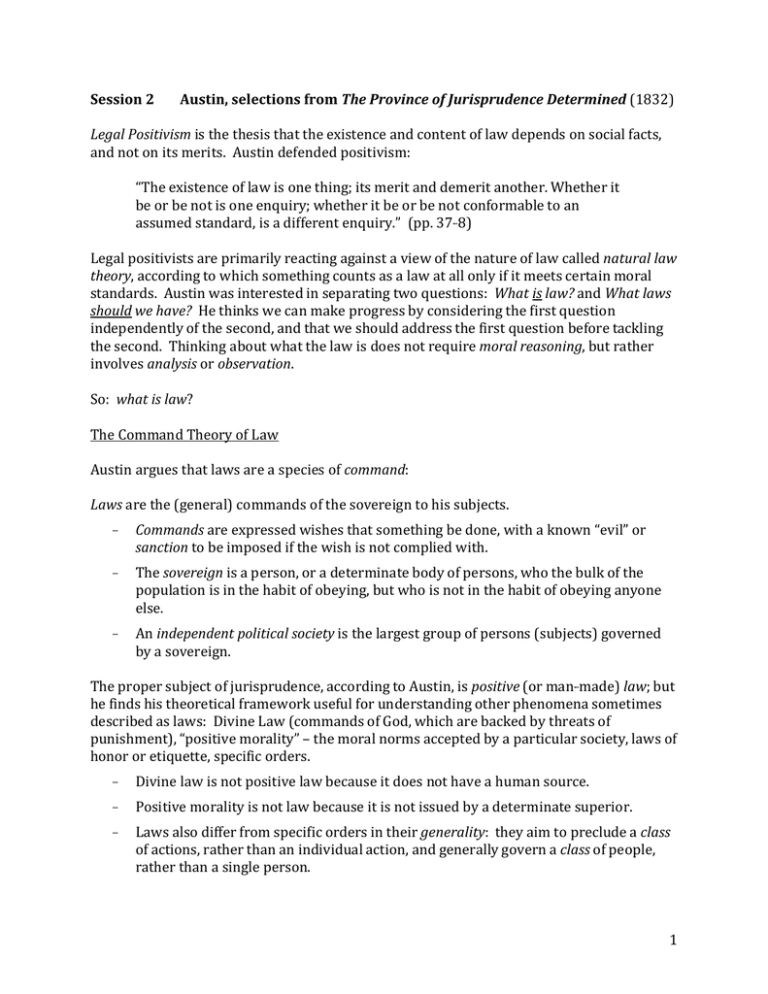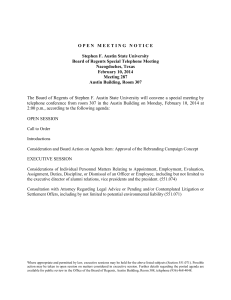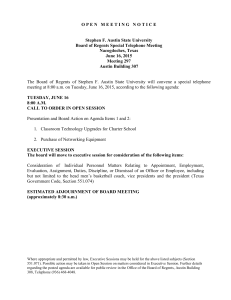and not on its merits. Austin defended positivism:
advertisement

Session 2 Austin, selections from The Province of Jurisprudence Determined (1832) Legal Positivism is the thesis that the existence and content of law depends on social facts, and not on its merits. Austin defended positivism: “The existence of law is one thing; its merit and demerit another. Whether it be or be not is one enquiry; whether it be or be not conformable to an assumed standard, is a different enquiry.” (pp. 37-­­8) Legal positivists are primarily reacting against a view of the nature of law called natural law theory, according to which something counts as a law at all only if it meets certain moral standards. Austin was interested in separating two questions: What is law? and What laws should we have? He thinks we can make progress by considering the first question independently of the second, and that we should address the first question before tackling the second. Thinking about what the law is does not require moral reasoning, but rather involves analysis or observation. So: what is law? The Command Theory of Law Austin argues that laws are a species of command: Laws are the (general) commands of the sovereign to his subjects. -­­ Commands are expressed wishes that something be done, with a known “evil” or sanction to be imposed if the wish is not complied with. -­­ The sovereign is a person, or a determinate body of persons, who the bulk of the population is in the habit of obeying, but who is not in the habit of obeying anyone else. -­­ An independent political society is the largest group of persons (subjects) governed by a sovereign. The proper subject of jurisprudence, according to Austin, is positive (or man-­­made) law; but he finds his theoretical framework useful for understanding other phenomena sometimes described as laws: Divine Law (commands of God, which are backed by threats of punishment), “positive morality” – the moral norms accepted by a particular society, laws of honor or etiquette, specific orders. -­­ Divine law is not positive law because it does not have a human source. -­­ Positive morality is not law because it is not issued by a determinate superior. -­­ Laws also differ from specific orders in their generality: they aim to preclude a class of actions, rather than an individual action, and generally govern a class of people, rather than a single person. 1 Some advantages of the command theory: -­­ It’s very simple/elegant -­­ It (unlike natural law theories) allows for the existence of bad laws (which patently seem to exist). -­­ It forms the basis of a naturalistic account of obligation – no metaphysical weirdness -­­ It has the virtue of generality, because it helps elucidate the relationships and similarities between positive law, positive morality, divine law, etc. -­­ It explains, according to Austin, the tight relationship between laws and obligations, or duties: laws, like all commands, oblige obedience (comparison to divine law). According to Austin, “command, duty, and sanction are inseparably connected terms: …each embraces the same ideas as the others…” (p. 34) Criticisms of the Command Theory H.L.A. Hart: “Law surely is not the gunman situation writ large, and legal order is surely not to be thus simply identified with compulsion.” (from “Positivism and the Separation of Law and Morals”) • Is Austin right that the concepts of duty or obligation are best understood in terms of commands backed by sanctions? Do we really have an obligation to comply with an order just because non-­­compliance would be costly? And what about this account of “Divine Law”? -­­ Austin makes strong claims about the meaning of “ought” or “duty”: o On p. 34 he calls “a command be disobeyed” and “a duty be broken” “equivalent expression[s]”. o On p. 38, when discussing Divine law, he claims that when divine and human laws conflict, we are obligated to obey the former, because the sanctions we’d face for disobedience would be greater: “this”, he writes, “is implied in the term ought: the proposition is identical, and therefore perfectly indisputable—it is our interest to choose the smaller and more uncertain evil , in preference to the greater and surer.” But surely being obligated does not mean the same thing as having a strong incentive! After all, it seems I can say that “if you steal you’ll be punished, and furthermore, you ought not to do it” without redundancy, and “you ought not to steal, even if it’s in your interest to do so” without contradiction. -­­ Are sanctions necessary for obligation? Are they sufficient? -­­ Being “obliged” v. being “obligated” -­­ Positive v. negative incentives: Austin’s discussion suggests that being obligated is merely a matter of having a powerful incentive (“I’ll make you an offer you can’t refuse!”). But is this right? Is this the right way to think about moral obligations? 2 Or divine commands? Also, what about positive incentives? Do they give rise to obligations? They don’t seem to – at least not for the “subject” of the offer. But why not, on Austin’s view? -­­ Relationship between duties and sanctions: Austin’s analysis suggests that sanctions ground duties – that we are obligated to obey a command because disobedience results in penalties. But intuitively, we might think things are the other way round: the obligation grounds the sanction – we are justified in punishing offenders because they violated an obligation. • Austin’s views most neatly accommodate criminal laws issued by a life-­­long sovereign, like a king. -­­ He has a much harder time explaining apparently sanctionless laws; customary or “judge-­­made” law; international law (which he acknowledges); and laws – including large portions of constitutional law, that set up offices, grant powers, etc. o Can the command theory explain judge-­­made law? What about power-­­ creating laws, like the law of wills? Are such laws best understandable as commands or wishes of the sovereign where disobedience is to be punished? -­­ Many states today are not governed by life-­­long sovereigns or by groups with a determined membership who are in power long enough for “habits of obedience” to develop, but rather have legislatures with changing memberships, whose laws remain binding long after the particular individuals who issued them are no longer in power. Can the command theory explain the bindingness of such laws? -­­ Moreover, legislators today are themselves bound by the laws they issue. Are they to be understood as commanding and threatening themselves? Does that make sense? -­­ Finally, Austin was drawn to the command theory in part by a desire to explain the normativity of law: the sense in which laws seem to give rise to (at least legal) obligations. But has he captured that phenomenon? It may be a necessary feature of a legal system that its dictates are broadly seen by those subject to them as legitimate, or at least make some claim to legitimacy. But do commands do that? -­­ How might a defender of the command theory respond to some of these worries? 3 MIT OpenCourseWare http://ocw.mit.edu 24.235J / 17.021J Philosophy of Law Spring 2012 For information about citing these materials or our Terms of Use, visit: http://ocw.mit.edu/terms.






